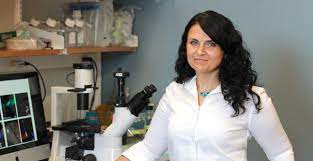Milka, Koupenova, PhD, Researcher, Division of Cardiovascular Medicine, focuses on how viral infections with single-stranded viruses (such as influenza or SARS-CoV-2) affect immunity-related molecular mechanisms in platelets, how those mechanisms mediate thrombotic outcomes during infection and how megakaryocytes (platelet-precursor cells) reprogram platelets during infection.
In an article posted in 2019 by Nature Microbiology, Dr. Koupenova describes how her interest in platelets began, “I was neither trained as a microbiologist, nor as an immunologist. I began this journey as a cardiovascular biologist with an interest in platelets, their role during influenza infection, and how this platelet-influenza interaction relates to myocardial infarction (MI).”
During this time, Dr. Koupenova and her colleagues showed that influenza can be found in platelets from symptomatic patients and when the virus spread it was rapidly taken up by platelets leading to platelet-mediated innate immune activation with thrombotic outcomes.
When the pandemic hit, early reports from China were showing that COVID-19 was associated with thrombotic outcomes and in some cases with thrombocytopenia. These reports suggested that SARS-CoV-2 crosses in its circulation and can be taken up by platelets leading to platelet activation and prothrombotic outcomes. Dr. Koupenova, along with other researchers, collected platelets from COVID-19 patients and from patients with myocardial infarction to establish RNA profiles and gain an understanding of mechanisms of activation.
In 2020, Dr. Koupenova was awarded an internal CTSA COVID-19 Pilot Project Grant to study the role of platelets and leukocytes in COVID-19 associated thrombotic risk. Additionally, she received a NIH- R01 funding to study, influenza-mediated reprogramming of platelets.
Both of these grants aim to understand how viral infections impact immuno-thrombosis. She explains that the research has been a collaborative effort with Dr. Freedman, Cardiovascular Medicine, an expert in atherothrombotic disease and high throughput data, Dr. Finberg and Dr. Jennifer Wang, Infectious Diseases and Immunology, who have been instrumental in collecting blood from COVID-19 patients and providing personnel, Dr. Mohan Somasundaran who conducts the BSL3 experiments and Dr. Jeff Rade, Cardiovascular Medicine, who provided blood from patients with myocardial infarctions.
Researchers recognize that understanding COVID-19 is a work in progress and there are many things we still don’t know about the virus but through the work of researchers like Dr. Koupenova and others, there is now insight into platelets and how they rapidly take up the virus leading to platelet-apoptosis and extracellular vesicle formation or necroptosis, platelet content release and how this release results in cell death with connecting prothrombotic outcomes and dysregulated immune response in the circulation.
When I asked Dr. Koupenova why she chose this as her research, she explained, “I don’t think I chose COVID and thrombosis, rather COVID chose me because of my expertise on viruses and platelets and the unique position to be at an institution with world-expertise in infection and immunity. This has been an amazing collaboration across UMass. Also, a lack of expertise on viral infections in the platelet field (when it comes to virally mediated platelet responses), all contributed to my choice.“
 Milka, Koupenova, PhD, Researcher, Division of Cardiovascular Medicine, focuses on how viral infections with single-stranded viruses (such as influenza or SARS-CoV-2) affect immunity-related molecular mechanisms in platelets, how those mechanisms mediate thrombotic outcomes during infection and how megakaryocytes (platelet-precursor cells) reprogram platelets during infection.
Milka, Koupenova, PhD, Researcher, Division of Cardiovascular Medicine, focuses on how viral infections with single-stranded viruses (such as influenza or SARS-CoV-2) affect immunity-related molecular mechanisms in platelets, how those mechanisms mediate thrombotic outcomes during infection and how megakaryocytes (platelet-precursor cells) reprogram platelets during infection.